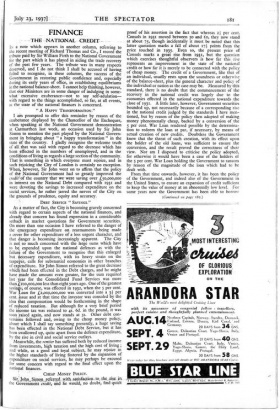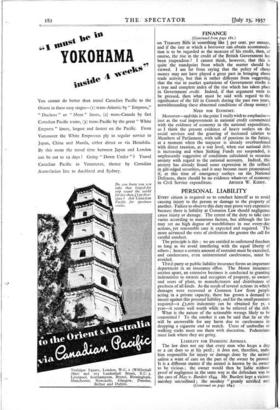FINANCE
- -THE --NATIONAL CREDIT- - - —
IN a note which appears in another column, referring to the recent meeting of Richard Thomas and Co.' I record the tribute paid by Sir William Firth to the National Government for the part which it has played in aiding the trade recovery of the past few years. The tribute was in many respects deserved, and I do not think I shall be accused of having failed' to recognise, in these columns, the success of the Govefnment in restoring public confidence and, especially during its early years of office, in establishing equilibriums in the national balance-sheet. I cannot help thinking, however, that our Ministers are in some danger of indulging in some- what excessive exuberance—not to say self-adulation- with regard to the things accomplished, so far, at all events, as the state of the national finances is concerned.
" A HAPPY TRANSFORMATION."
I am prompted to offer this reminder by reason of the exuberance displayed by the Chancellor of the Exchequer, when speaking at the National Government demonstration at Carmarthen last week, an occasion used by Sir John Simim to mention the part played by the National Govern- ment -in bringing about " a happy transformation " in the state ,of the country. I gladly recognise the welcome truth all ;that was said with regard to the decrease which has been effected in the numbers of unemployed, and in the conditions of living as regards a large section of the community. That is something in which everyone must rejoice, and in such rejoicing the City of London is certainly no exception. When, however, Sir John went on to affirm that the policy of the :National Government had so greatly improved the creditlof the country-that we were saving over £5o,000,000 in interest on the National Debt compared with 1931 and were -devoting the savings to increased expenditure on the social services, he rather jarred the nerves of the City on the grounds of prudence, equity and accuracy.
DEBT SERVICE " SAVINGS."
As a matter of fact, the City is becoming gravely concerned with regard to certain aspects of the national finances, and already that concern has found expression in a considerable setbaak in market quotations for Government securities. On niore than one occasion I have referred to the danger of the emergency expenditure on rearmaments being made a cover for other expenditure of a less urgent character, and that danger is becoming increasingly apparent. The City is not so much concerned with the large sums which have to be expended upon the national defences as with the failure of the Government to recognise that this enlarged but Aer_essary expenditure, with its heavy strain on the taxpater, calls for substantial economies in other branches, of ex#enditure. Sir John Simon referred to the great decrease whick had been effected in the Debt charges, and he might have *lade the amount even greater, for the sum required last year for the Consolidated Fund Services was more than jioo,000,000 less than eight years ago. One of the greatest savings; of course, was effected in 1932, when the 5 per cent. War Loan for £2,00p,000,000 was converted into a 34 per cent. issue and at that time the investor was consoled by the idea that compensation would be forthcoming in the shape of reduced taxation. But although for a very brief period the income tax was reduced to 4s. 6d. in the pound, it was soon raised again, and now stands at 5s. Other debt con- versions followed and, owing to the cheap money polcy, about which I shall say something presently, a huge saving has been effected in the National Debt Service, but it has been swallowed up, quite apart from the defence expenditure, by the Fise in civil and social service outlays. Meanwhile, the render has suffered both by reduced income from investments, high taxation and the high cost of living ; and while, as a good and loyal, subject, he may rejoice in the higher standards of living fostered by the expansion of expenditure on social services, he may perhaps be- excused for some concern with regard to the final effect upon the national finances.
Sir, jolin $knon refeusct with Asti,Actiop.-t9,4.4., the Government eredit, and he would, no doubt, find quick CHEAP MONEY POLICY. proof of his assertion in the fact that whereas 24 per cent. Consols in 1931 moved between 5o and Co they now stand at about- 75, though- incidentally it must-be noted that this latter quotation marks a fall of about 174 points from' the price touched in i935. Even so, the present price of Consols marks a great rise from 193r, but the question which exercises thoughtful observers is how far this rise represents an improvement in the state of the national credit or how far it is merely to be connected with the policy of cheap money. The credit of a Government, like that of an individual, usually rests upon the soundness or otherwise of the balance-sheet, plus the general character and policy of the individual or nation as the case may be. Measured by this standard, there is no doubt that the commencement of the recovery in the national credit was largely due to the economies effected in the national expenditure towards -the close of 1931. A little later, however, Government securities bounded up, not necessarily because of a corresponding :rise in the national credit judged by the standards I have men- tioned, but by reason of the policy then adopted of making money phenomenally cheap, backed by a conversion of the 5 per cent. War Loan rendered possible by the determina- tion to redeem the loan at par, if necessary, by means of actual creation of new credits. Doubtless the Government knew that the threat of such creation, with its effect upon the holder of the old loans, was sufficient to ensure the conversion, and the result proved the correctness of their view. Nor am I disposed to criticise the policy adopted, for otherwise it would have been a case of the holders of the 5 per cent. War Loan holding the Government to ransom by reason of the magnitude of the loan which had to- be dealt with.
From that time onwards, however, it has been the policy of the Government, and indeed also of the Government in the United States, to ensure an expansion of credit sufficient to keep the value of money at an abnormally low level. For some years now the Government has been able to borrow (Confirmed on page 182.) FINANCE (Crtinued. from page isr.) on Treasury Bills' -something -Mce per cent. per annum, and if the rate at which a borrower can-obtain accommoda- tion is to be -regarded as the measure of his credit, then, of course, the rise in the credit of the British Government has been stupendous ! I cannot think, however, that this is quite the standpoint from which the matter should be viewed. I am far from saying that the policy of cheap money may not have played a great part in bringing about trade activity, but that is rather different from suggesting that the rise in market quotations of Government stocks is a true and complete index of the rise which has taken place in Government credit. Indeed, if that argument were to be pressed, then what must be said with regard -to the significance of the fall in Consols during the past two years, notwithstanding thew abnormal conditions of cheap money ?
- NEED FOR ECONOMY.
Moreover—and this is the point I really wish to emphasise— just as the real improvement in national credit commenced with the evidence of economy in the national expenditure, so I think the present evidence of heavy outlays on - the social services and the granting of increased salaries. to Members of Parliament, with talk of pensions in the futbre, at a moment when the taxpayer is already overburdened with direct taxation, at a war level, when our national debt is increasing and when Sinking Funds are suspended, is unpleasantly suggestive of conditions calculated to occasion anxiety with regard to the national accounts. Indeed, this anxiety has already found some expression in the setback in gilt-edged securities, and it may become more pronounced if, at this time of emergency outlays on the , National Defences, there should be no evidence whatever of, economy in Civil Service expenditure. ARTHUR W. KIDDY.































































 Previous page
Previous page